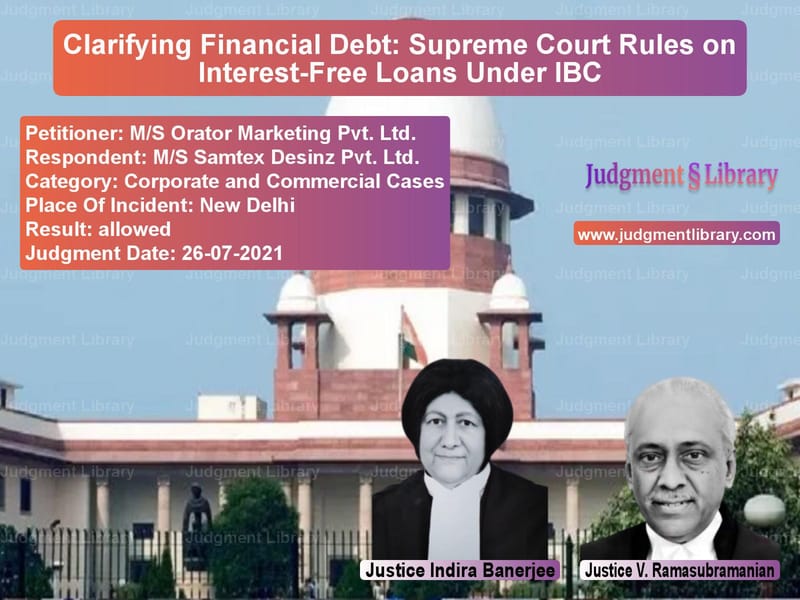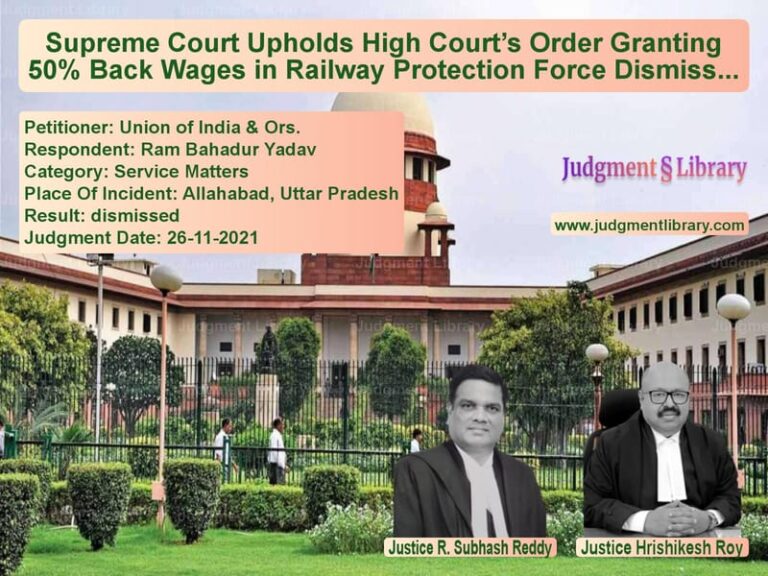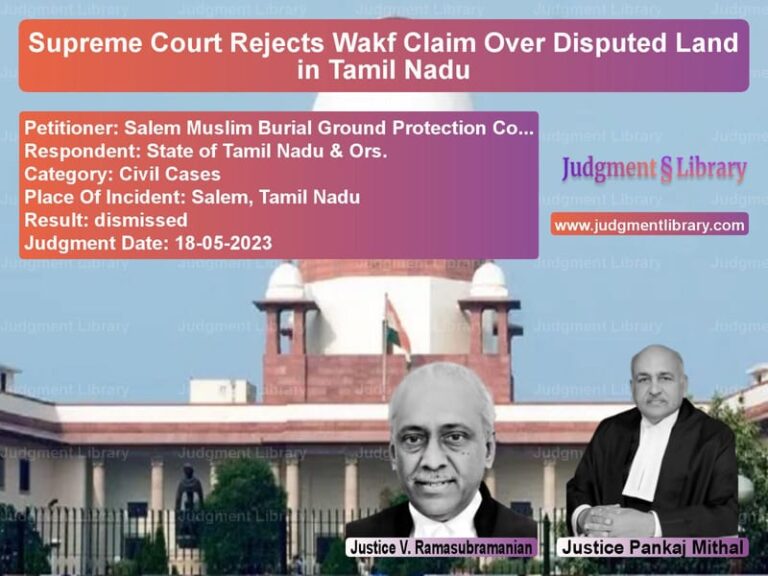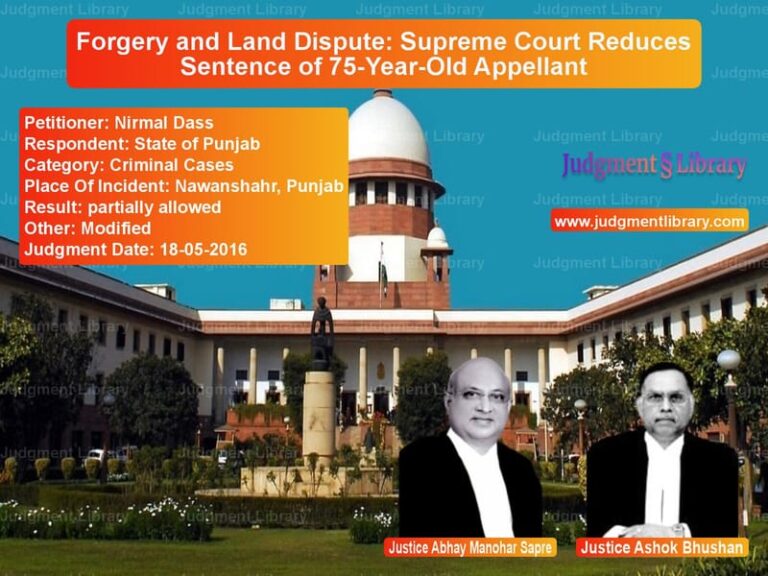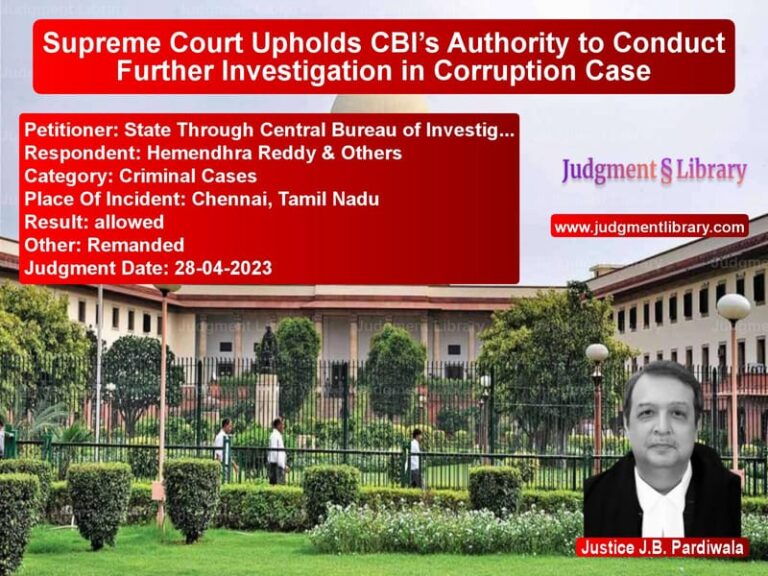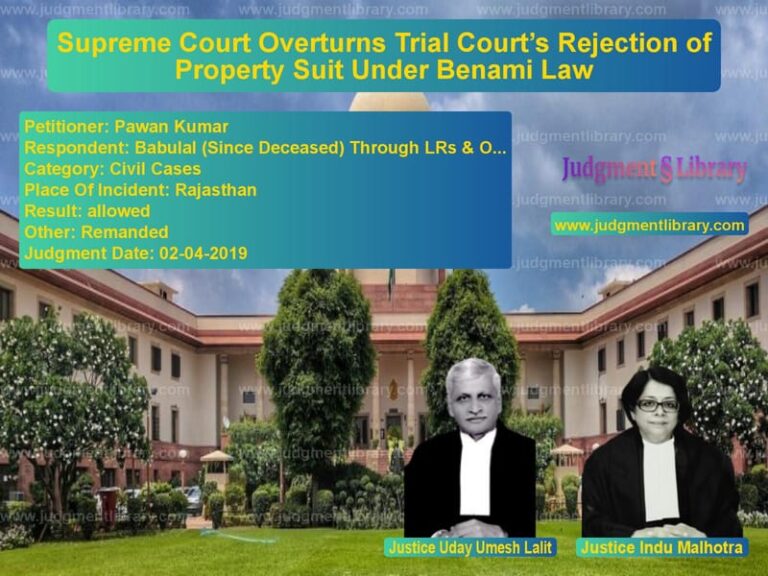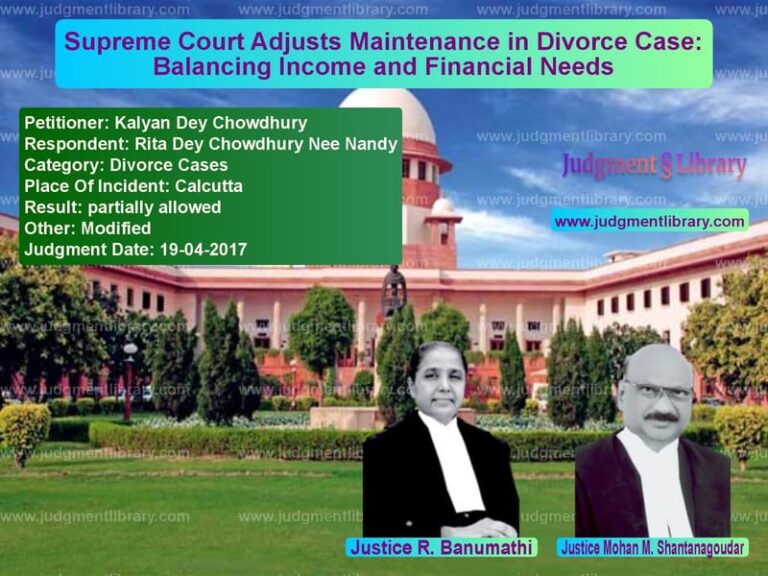Clarifying Financial Debt: Supreme Court Rules on Interest-Free Loans Under IBC
The case of M/S Orator Marketing Pvt. Ltd. v. M/S Samtex Desinz Pvt. Ltd. dealt with a significant issue under the Insolvency and Bankruptcy Code, 2016 (IBC). The primary question before the Supreme Court was whether an interest-free term loan given to a corporate debtor for working capital requirements qualifies as a ‘financial debt’ under Section 5(8) of the IBC.
Background of the Case
The case originated when M/s Sameer Sales Private Limited (the original lender) advanced an interest-free term loan of Rs. 1.60 crores to the corporate debtor, M/s Samtex Desinz Pvt. Ltd., to meet its working capital requirements. This loan was later assigned to the appellant, M/S Orator Marketing Pvt. Ltd.
Read also: https://judgmentlibrary.com/agr-dues-dispute-supreme-court-rejects-modification-plea/
The corporate debtor was required to repay the loan by February 1, 2020. While some payments were made, Rs. 1.56 crores remained outstanding. The appellant filed a petition under Section 7 of the IBC before the National Company Law Tribunal (NCLT) seeking initiation of the Corporate Insolvency Resolution Process (CIRP) against the corporate debtor.
Decisions by NCLT and NCLAT
The NCLT dismissed the petition, ruling that the appellant was not a financial creditor under the IBC because the loan was interest-free and thus did not qualify as a ‘financial debt’ under Section 5(8). The tribunal observed:
“Mere grant of loan and admission of taking loan will ipso facto not treat the applicant as ‘Financial Creditor’ within the meaning of Section 5(8) of the Code.”
The appellant appealed to the National Company Law Appellate Tribunal (NCLAT), which upheld the NCLT’s ruling. The NCLAT stated that for a debt to be classified as a financial debt, it must be disbursed against consideration for the time value of money. The absence of an interest clause in the loan agreement led the appellate tribunal to conclude that the transaction did not qualify as a financial debt.
Read also: https://judgmentlibrary.com/personal-guarantors-and-insolvency-supreme-court-upholds-ibc-provisions/
Arguments Before the Supreme Court
Senior counsel appearing for the appellant argued that the lower tribunals misinterpreted Section 5(8) of the IBC. He contended that the phrase “financial debt” should be interpreted in a broader sense, including loans that have the effect of financing a corporate debtor’s operations.
The respondent, on the other hand, argued that a financial debt must involve consideration for the time value of money. Since the loan was interest-free, it did not fulfill this requirement.
Supreme Court’s Ruling
The Supreme Court disagreed with the lower tribunals and ruled in favor of the appellant. It held:
“The definition of ‘financial debt’ in Section 5(8) of the IBC cannot be read in isolation, without considering some other relevant definitions, particularly, the definition of ‘claim’ in Section 3(6), ‘corporate debtor’ in Section 3(8), ‘creditor’ in Section 3(10), ‘debt’ in section 3(11), ‘default’ in Section 3(12), and ‘financial creditor’ in Section 5(7).”
The Court emphasized that financial debt includes an outstanding principal amount and, where applicable, interest. However, even if interest is not payable, the principal amount alone can qualify as a financial debt if it meets the criteria outlined in the IBC.
The Court found that the definition of ‘financial debt’ under Section 5(8) is illustrative, not exhaustive. It includes any amount raised under a transaction that has the commercial effect of borrowing.
“The NCLT and NCLAT have overlooked the words ‘if any’ in Section 5(8), which could not have been intended to be otiose. Financial debt means outstanding principal due in respect of a loan and would also include interest thereon, if any interest were payable thereon.”
Key Takeaways from the Judgment
- An interest-free loan can still be classified as a financial debt under the IBC.
- The definition of financial debt is not limited to loans with interest; it extends to any transaction that has the commercial effect of borrowing.
- The tribunals erred in narrowly interpreting Section 5(8) of the IBC.
- The Supreme Court reaffirmed that the legislative intent behind the IBC is to facilitate the resolution of corporate insolvency in a broad and inclusive manner.
Conclusion
This judgment has significant implications for lenders and borrowers under the IBC. By clarifying that an interest-free loan can still constitute a financial debt, the Supreme Court has expanded the scope of what qualifies as a financial debt under the IBC. This ruling ensures that creditors who provide working capital to corporate debtors, even without charging interest, are not deprived of their right to initiate CIRP when a default occurs.
The appeal was allowed, and the Supreme Court set aside the judgments of the NCLAT and NCLT. It directed that the petition under Section 7 of the IBC be reconsidered in light of its ruling.
Petitioner Name: M/S Orator Marketing Pvt. Ltd..Respondent Name: M/S Samtex Desinz Pvt. Ltd..Judgment By: Justice Indira Banerjee, Justice V. Ramasubramanian.Place Of Incident: New Delhi.Judgment Date: 26-07-2021.
Don’t miss out on the full details! Download the complete judgment in PDF format below and gain valuable insights instantly!
Download Judgment: ms-orator-marketing-vs-ms-samtex-desinz-pv-supreme-court-of-india-judgment-dated-26-07-2021.pdf
Directly Download Judgment: Directly download this Judgment
See all petitions in Bankruptcy and Insolvency
See all petitions in Company Law
See all petitions in Corporate Compliance
See all petitions in Judgment by Indira Banerjee
See all petitions in Judgment by V. Ramasubramanian
See all petitions in allowed
See all petitions in supreme court of India judgments July 2021
See all petitions in 2021 judgments
See all posts in Corporate and Commercial Cases Category
See all allowed petitions in Corporate and Commercial Cases Category
See all Dismissed petitions in Corporate and Commercial Cases Category
See all partially allowed petitions in Corporate and Commercial Cases Category

